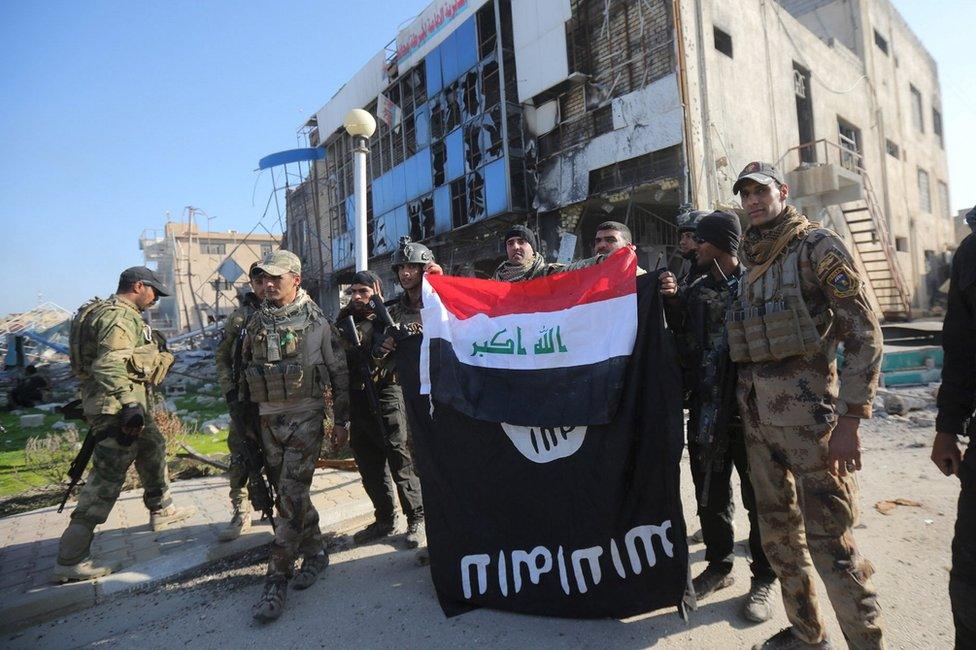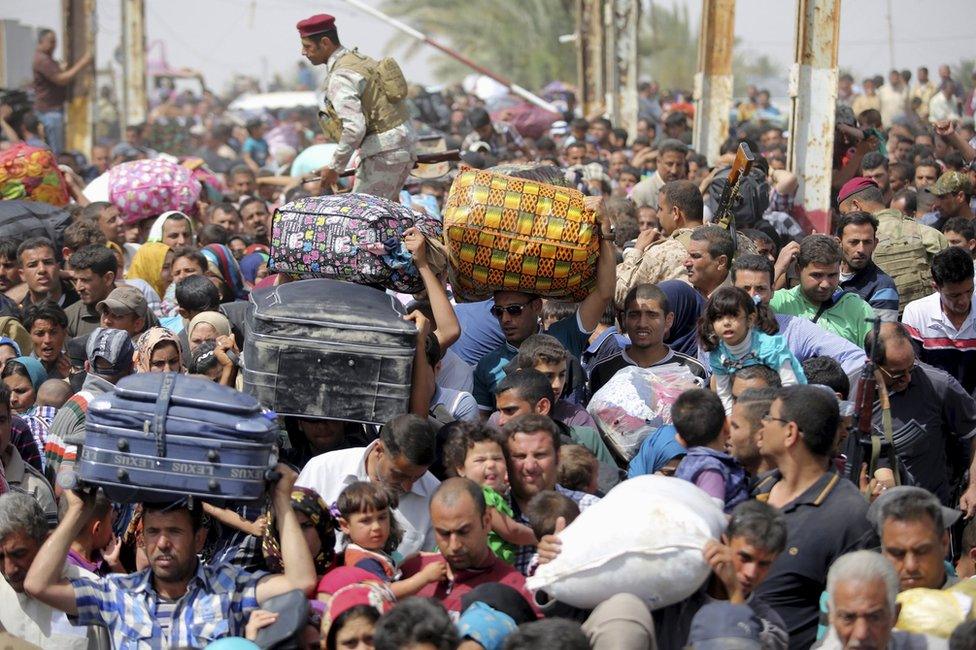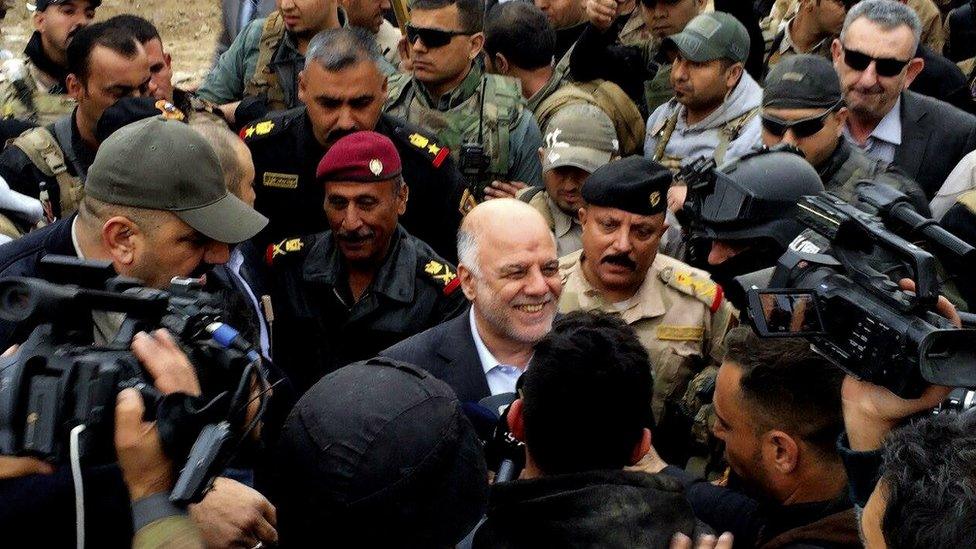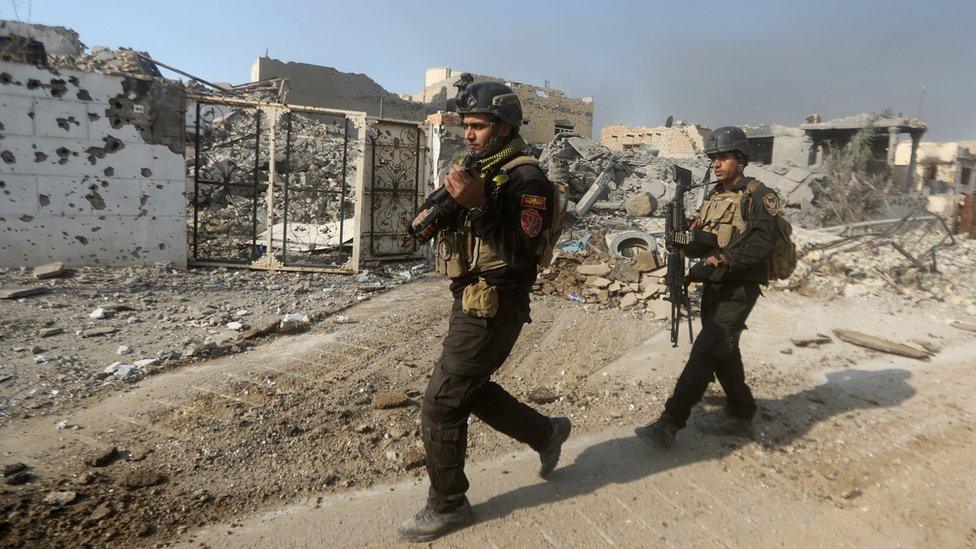Iraq conflict: Damage to Ramadi hampers return of displaced people
- Published

After months of cautious advances, Iraqi security forces retook Ramadi on Sunday
The Iraqi flag is flying again over the provincial government compound in Ramadi, but there is no visible sign of life in the city.
Military officials believe hundreds, possibly thousands, of people remain trapped in districts close to the city centre in which mopping-up operations against the last remaining Islamic State (IS) fighters are continuing.
They may have gone into hiding hoping that Iraqi forces will clear their areas as soon as possible.
A few hundred did manage to escape. About 60 families were taken to safety in the nearby town of Habbaniyah by the security forces on Tuesday night.
They were rescued hours earlier near the former government compound and were handed food and water.
Among them were many women, children and elderly people.
The BBC's Thomas Fessy: "Among the civilians, there were many women, children and elderly people"
"We tried to get closer to where the army was and we screamed for help. When they heard us, they rushed towards us," Ferdous Shabban said.
She explained that IS fighters wanted to take them to another district but that many families refused and shut their doors. The jihadists then opened fire on their houses.
'Terrible conditions'
Ramadi largely emptied in the months leading up to last week's offensive as Iraqi forces progressively surrounded the city to suffocate IS fighters, who took control in May.
Tens of thousands of people sought shelter in Habbaniyah or in camps set up on the road leading to the capital, Baghdad, about 90km (55 miles) to the east.

Tens of thousands of Ramadi residents fled the city when it fell to IS in May
Ibrahim Najm took his family to "Habbaniyah Tourist City" in August.
This is a tourist resort that was erected on the shores of Lake Habbaniyah in the late 1970s and quickly became an attractive destination for tourists from all over the Middle East.
It is still called "Tourist City" - even in aid agencies' reports - but tourists have long been replaced by displaced people.
"The conditions here are terrible," Mr Najm said over the phone.
"We've been living in a tent all this long, it doesn't protect us from the rain; it's very muddy."
Mr Najm's family was given a heater to cope with the cold. But they worry they do not have enough fuel for the whole winter.
Local authorities are distributing food to displaced people in Habbaniyah Tourist City but Mr Najm complains that it is "far from enough."

Iraq's prime minister has formed a committee to oversee Ramadi's reconstruction
"They give us 1kg (2.2lbs) of flour every five days to make bread but we are twelve in the family!"
"We survive on different kinds of beans."
More than 300 families have been squatting in one of the derelict resort hotels, according to the UN refugee agency (UNHCR).
It says the building has no running water, heating or electricity while stagnant water on lower floors is damaging its foundations.
Conditions in the hotel are so dire that aid agencies are building a new camp nearby to relocate these families into new shelters.
Sacrificed city
Ramadi is a city that has been sacrificed in battle. The scale of destruction is enormous, delaying the prospect of return for those who lived in areas that have been liberated.
"We hope to go back as soon as possible, but we heard on the news that it has been so destroyed I know it's not going to happen any time soon," lamented Mr Najm.
The UN says it will be essential to ensure conditions are in place for people to return in safety.

Hundreds of IS fighters are believed to be hiding in the centre and outskirts of Ramadi
Areas are still insecure, littered with improvised explosive devices (IEDs) and booby-traps; electricity and water services have been damaged.
The government is planning to hand over responsibility for securing and stabilising the city to Sunni tribal fighters, local and federal police, allowing Iraqi security forces to move to other battlefields.
Shia militias have been kept from the frontline to avoid a sectarian backlash following reports of abuses after they played a central role in the retaking of the predominantly Sunni northern city of Tikrit earlier this year.
A failure to prevent reprisals against some of the locals who chose to co-operate with Islamic State could put the stabilisation process at risk.
But we are not even there yet, and it may take days before Iraqi security forces regain full control of the city.
In the meantime, aid agencies are providing emergency assistance to the displaced people - plastic sheets to insulate tents, jerry cans for water and toiletries.
"It makes me feel bad to see my family in a tent all day," Mr Najm says. "We have nothing to do, we're even bored."
"All day long I wonder: 'What is our future?'"
How to listen to From Our Own Correspondent, external:
BBC Radio 4: Saturdays at 11:30
Listen online or download the podcast.
BBC World Service: At weekends - see World Service programme schedule or listen online.